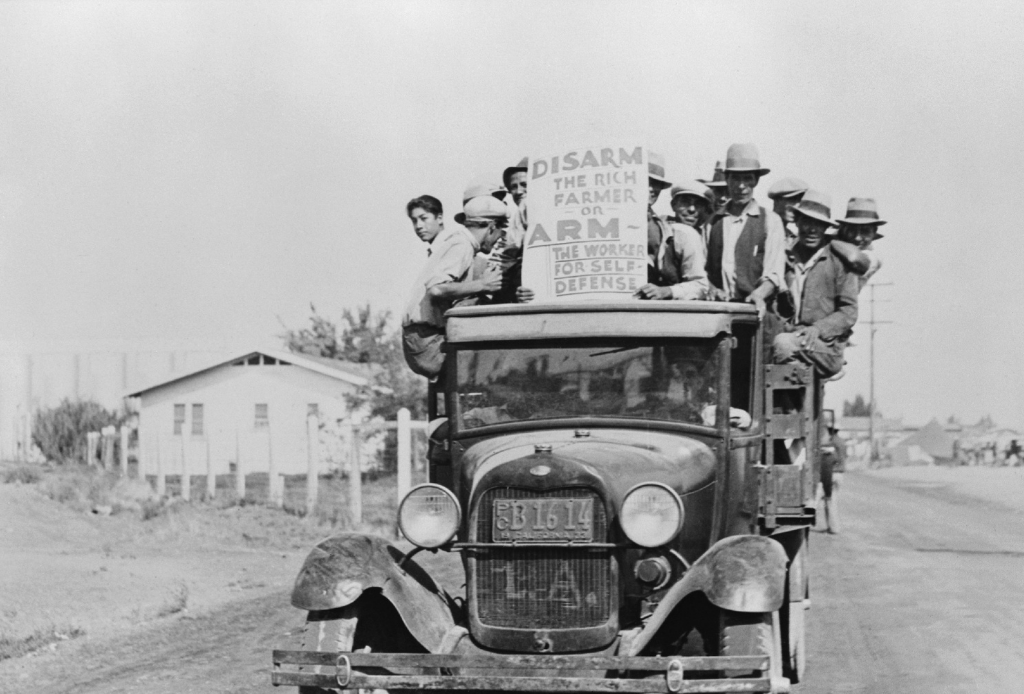Sociedades mutualistas

Credit: The Everett Collection via Canva.com
| Giver: | Other |
|---|---|
| Receiver: | Individual or unstructured/informal group |
| Gift: | Other |
| Approach: | Reciprocal Gift |
| Issues: | 10. Reduced Inequalities, 11. Sustainable Cities and Communities, 3. Good Health and Well-Being, 8. Decent Work and Economic Growth |
| Included in: | Mutual Aid |
Sociedades mutualistas are mutual aid associations that once held a prominent place in Mexican-American and Latino communities in the United States. A form of economic collective that originated in Mexico, mutualistas first gained a foothold in the US during the late 19th century, as waves of new immigrants joined together to offer each other financial support.
Initially, mutualistas provided life insurance to workers unable to obtain conventional policies; over time they expanded to offer sick benefits, low-interest loans and legal aid. The mutualistas also played a vital role in preserving the native heritage of its members, organizing social events, promoting bilingualism and maintaining libraries and other educational resources. By instilling a sense of solidarity among Mexican Americans, mutualistas helped build thriving communities that remain hubs of social, cultural and political activity to this day.
The earliest mutualistas emerged as labor groups in Mexico during the 19th century. By 1890, over 100 mutualistas were active in Mexico, with a total membership of more than 50,000 workers. Many immigrants who settled in the US brought the mutualista model with them, forming small economic cooperatives with other residents of their barrios, or neighborhoods. These groups sustained themselves by collecting member dues, which funded insurance and other forms of assistance.
One of the first formal mutualistas in the US, the Alianza Hispano-Americana, was established in Tucson, Arizona, in 1894. The group quickly expanded, eventually becoming the largest mutualista network in the Southwest. This period also saw the founding of the Gran Círculo de Obreros de Auxilios Mutuos of San Antonio, Texas. In Texas, the mutualistas attracted large numbers of Tejanos – descendants of Spanish Creoles and other Latino groups that had settled in the region before it became a state – who saw the new immigrants arriving from Mexico as natural allies.
While the majority of mutualistas focused on the welfare of a distinct community, some came together around specific social and economic goals. A number of groups, notably the Sociedad Morelos Mutua de Panaderos in San Antonio, functioned as trade unions. Other associations such as La Gran Liga Mexicanista de Beneficencia y Protección in Laredo, Texas, focused on social justice issues, fighting for the rights of tenant farmers, fair legal representation and the integration of public schools.
The Great Depression delivered a fatal blow to the broader mutualista _movement. Mass unemployment depleted the financial resources of many societies, while an aggressive deportation campaign by the US government led to sharp declines in membership. By the 1960s, only a handful of _mutualistas remained active. Despite their diminished influence, the mutualistas provided a model for later immigrant advocate associations, notably the Hermandad Mexicana Nacional. While the presence of mutualistas in community life may have faded, their core values – cooperation, cultural preservation and solidarity – continue to inform and inspire Mexican-American activists in the 21st century.
Contributor: Stephen Meyer
| Source type | Full citation | Link (DOI or URL) |
|---|---|---|
| Website |
Condes, Yvonne. “A Centuries-Old Legacy of Mutual Aid Lives on in Mexican American Communities.” PBS SoCal, June 24, 2021. |
https://www.pbssocal.org/shows/lost-la/a-centuries-old-legacy-of-mutual-aid-lives-on-in-mexican-american-communities |
| Book |
Hernandez, José Amaro. Mutual Aid for Survival: The Case of the Mexican American. Malabar, FL: Krieger, 1983. |
9780898745467 |
| Website |
Pycior, Julie Leininger. “Sociedades Mutualistas.” Texas State Historical Society, July 1, 1995 (updated January 23, 2020). |
https://www.tshaonline.org/handbook/entries/sociedades-mutualistas |
| Publication |
Rivera, Jose A. “Research Report #002: Mutual Aid Societies in the Hispanic Southwest: Alternative Sources of Community Empowerment.” Southwest Hispanic Research Institute, University of New Mexico, Fall 1984. |
https://digitalrepository.unm.edu/cgi/viewcontent.cgi?article=1033&context=shri_publications |
| Publication |
Weise, Julie M. “Mexican Nationalisms, Southern Racisms: Mexicans and Mexican Americans in the U.S. South, 1908-1939.” American Quarterly 60, no. 3 (September 2008): 749-77. |
https://www.jstor.org/stable/40068523 |